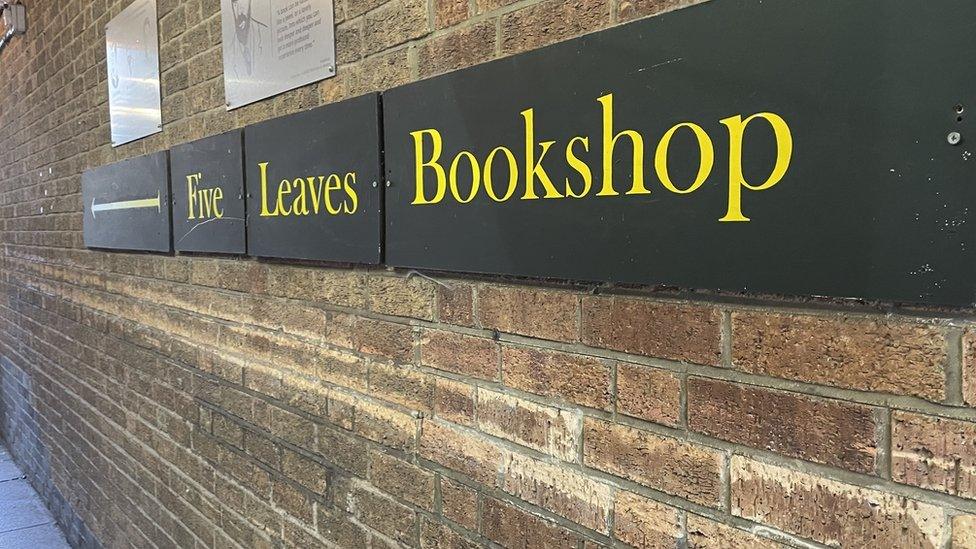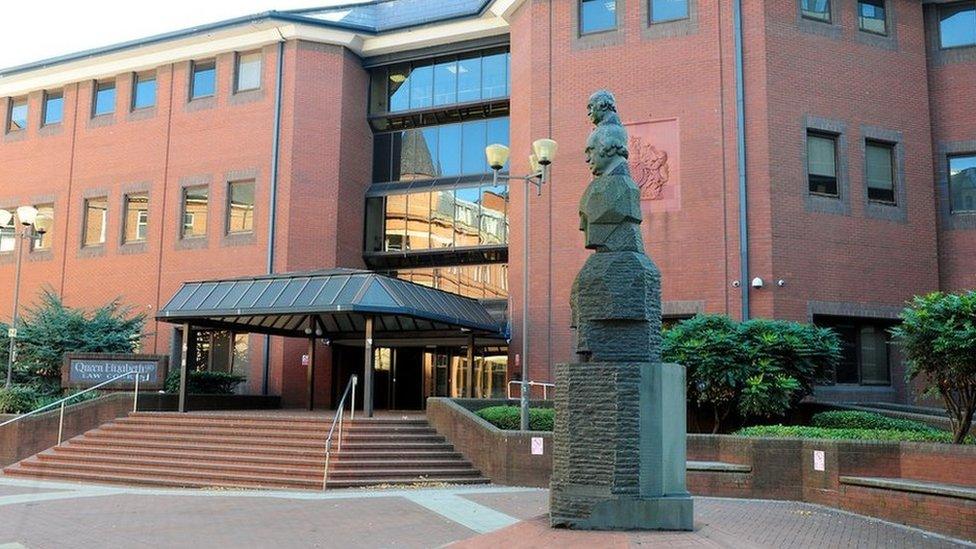William Howitt: Ex-soldier accused of terror plot 'felt inferior'
- Published

Prosecutors say the plot centred on Nottingham's Five Leaves Bookshop
An ex-soldier accused of a far-right plot to set fire to a left-wing bookshop has told a jury he had an "inferiority complex" after leaving the Army
William Howitt, of West Bridgford, Nottinghamshire, is on trial accused of writing a plan to burn down the Five Leaves Bookshop in Nottingham.
The 27-year-old took to the witness stand at Birmingham Crown Court on Tuesday.
He denies a terrorism charge.
Howitt had allegedly written a detailed plan to carry out an arson attack on the bookshop on his iPhone, which was discovered when he was stopped at East Midlands airport on 5 January.
It was written in the Notes app on September 7 2020, the prosecution say, with counter-terrorism officers also finding other anti-Semitic, anti-Marxist and pro-Nazi messages, pictures and videos.
Prosecutor Emma Gargitter previously told the court it was their case that Howitt had chosen the bookshop as his intended target because he held views "strongly opposed to the things that [it] was associated with, namely left of centre political and social issues, such as the Black Lives Matter movement".
Howitt told the jury how he struggled with his mental health since before leaving the Army, which led to him drinking excessive amounts of alcohol and taking cocaine.
He said he had an "inferiority complex" after leaving the Armed Forces, partly due to his mental health, and becoming a crane driver instead.
He said: "My friend in the Army would laugh at me, saying you've gone from the British army to a crane operator.
"I had an inferiority complex because I went from something to just a construction site.
"I was in the Grenadier Guards, one of the most famous regiments in the world. I had all these keepsakes from the Army and then I was just trudging round grotty building sites.
"It did affect me quite a bit. I started drinking a lot more and more regularly."
'Drinking to excess'
When asked by his barrister, John Lyons, how much alcohol he was consuming by 2020, Howitt said he was drinking wine, cider or beer every day.
He said: "By the end of the evening I would be drunk. It has always been there since the Army.
"I was drinking in the Army, not daily, but on the weekends and when we would drink, it would be to excess."
Howitt said his drinking "picked up" during the Covid pandemic and by September 2020, when he is alleged to have written the arson attack plan, he was also taking cocaine every week.
When asked by Mr Lyons why he started drinking so much, Howitt responded: "My mental health. I was on my own a lot more, I went from the Army where I was always around people.
"Being a crane operator is quite a lonely job, you often don't know anyone on the site and you're away from home Monday to Friday."
Howitt told the court taking cocaine and alcohol had an impact on the kind of messages he would send to people.
He said: "It makes you talk a huge amount. It would stimulate me to have conversations on my phone, you try and come across as the subject matter expert in any topic, or enthusiastic about everything.
"It can either make you over-friendly or make you cross or angry. Generally it would make me feel both.
"You talk for the sake of talking. Anyone who has taken cocaine will know what I mean."
Howitt denies one count of preparation of terrorist acts under section 5 of the Terrorism Act 2006.
The trial, in front of Judge Paul Farrer KC, continues.

Follow BBC East Midlands on Facebook, external, on X, external, or on Instagram, external. Send your story ideas to eastmidsnews@bbc.co.uk, external.
- Published30 October 2023
